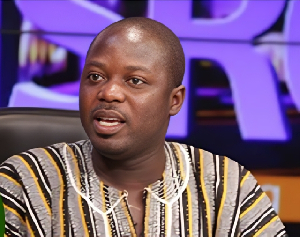A GNA feature by Christian Akorlie
Accra, April 15, GNA - One of the most laudable benefits showing from the recent redenomination of the Cedi has been the drastic cut in the sheer volumes of physical cash which Ghanaians were obliged to tug about for payment for goods and services in their day-to-day affairs. Until July 2007, a simple transaction such as the payment of a rent advance of, say, 15 million cedis by an "un-banked" tenant to an equally un-banked landlord came with serious security and time implications; that amount, in the old currency, was simply so voluminous that conveying the money in public and counting it as payment were in themselves gruelling transactions.
But shrinking the volumes of the currency even at the same value turns out to be but a fraction of the remedy for a much bigger malady plaguing the local payment system and the way we generally conduct financial transactions in this country. Be it re-denominated or not, why must anyone always carry large sums of paper money on their persons before they may conclude basic and routine transactions?
Even if the risk of loss or burglary were not real, why must I journey to some office at the other end of town, my pocket or wallet stashed with cash, just to pay off my water or electricity bills or any other utilities for that matter? Why must I personally show up at some counter or entrance to offer paper money as payment for simple recreational services like theatre, a concert or direct satellite television? And why must I have hard cash on my person before venturing into my regular supermarket for domestic supplies? We may very well wonder why, in 21st Century Ghana, every little transaction is still so rigidly cash-based.
The stark fact is that, Ghana has lagged way behind most of the world (including many of its peers in Africa) in the general quest to boost micro economic activity by reducing the role played by physical cash in daily transactions and by encouraging the creation of a cashless society. Indeed some ground-breaking initiatives like the marginal use of credit and debit cards and especially the introduction the E-Zwich are commendable.
However, experts in the financial sector have stressed that unless something radically innovative, functional and savvy is introduced, which accounts for attitudes as well as the huge un-banked population, the country's dream of building a functionally cashless society in the shortest possible time could be elusive. As many as 80 per cent of Ghana's population neither has nor operate a bank account, although the majority of the "un-banked" are economically active in either the formal or informal sectors of the economy.
Easing the Cash Burden
Banked or "un-banked", it is obvious that the active population is now hurting under the burden of the inconveniences and constrictiveness of having to endure heavy, cumbersome and usually unsafe cash-based payments in their day-to-day affairs and transactions.
Unfortunately, alternative modes of payment like credit cards, direct debit cards and even the relatively common bank cheques, all of which are far less reliant on cash, are so miserably limited in use and unpopular on the Ghanaian market that they hardly make any significant impact on the efficiency and ease of transactions.
In 2008 when Afric Xpress, a global electronic payment solution specialist, introduced itself onto the Ghanaian market, announcing its mission of introducing a fast, reliable and convenient electronic-based payment system to transform lifestyles and the way Ghanaians conducted everyday business, there were no sceptics at all, except for the many market watchers who wondered just how this could be done - given the fact that not enough Ghanaians (only 20 per cent of the population) were formally hooked onto the banking system.
Fortunately, Afric Xpress' primary working tool does not necessarily require the individual to own a formal bank account before enjoying the convenience of electronic payment; it is a surprisingly common device which everybody now carries and which has suddenly become one of man's most indispensable personal accoutrement in everyday life - the cellular or mobile phone.
The Change Agent
In very sharp contrast to the rather negligible size of Ghana's banked population, there has been a phenomenal growth in the use and popularity of mobile phones.
With permissible reference to the swarm of mobile telephone service providers streaming into the country, and the "aggression" with which they market their products, it may be fair to state that Ghanaians appear to have overtaken the rest of the world in embracing this incredible technological breakthrough of the last century. From the pitiful national tele-density status of just about 0.7 per cent in 2000, Ghanaians' access to telephones rapidly soared to 5.5 per cent by the end of 2003; at the close of 2008 Ghana's tele-density had sky rocketed to the region of 50 per cent. National Communications Authority (NCA) figures point to an exponential growth in the number of mobile phone subscribers from 7,604,053 at the beginning of 2008 to 11,302,647 subscribers by December 2008.
This literally means that at least a whopping 11 million people, out of Ghana's population of 22 million, now carry and use cellular or mobile phones.
The availability, accessibility, simplicity and the sheer convenience of this revolutionary medium of direct inter-personal communication has removed not only geographical barriers but also the prohibitive barriers of poverty and illiteracy from the communication chain. That alone should explain why today one can find the business executive, the fishmonger, the student, the lawyer, the herdsman, the farmer and the street hawker all using mobile phones.
The "txtNpay" (pronounced text-n-pay) Platform One incredibly innovative application of the mobile phone technology is its use for the provision of financial services - a potential which Afric Xpress, has exploited and incorporated into its high-tech electronic payment system and which the company says is about to turn every mobile phone user's handset into an "electronic wallet". Afric Xpress, a global leader in electronic payment solution which specializes in mobile payments, is introducing into West Africa, starting with Ghana, its robust and highly scalable transaction engine designed to provide customers, merchants and agents with the most convenient means of paying and receiving payment for goods and services through their mobile phones .or on the internet. Afric Xpress is about to launch its product, the "txtNpay" (Eds: Correct), a secured mobile phone-based payment system which enables its users to send money to any other person with a mobile phone, pay utility bills, purchase goods and services, buy pre-paid phone credits, check their bank account balance and engage in many more transactions with their phones.
The "txtNpay" technology uses an application which is SMS-based and essentially consists of an electronic platform that is directly accessed from the customer's mobile handset.
The "txtNpay" product operates along a smooth interface with telecom companies, local banks utility companies, internet service providers, hospitality institutions, tertiary institutions a network of supermarkets and social service providers and an extensive chain of merchant outlets across the capital. Its transactions are strictly automated, cashless and run in real-time.
"Our company's mission is to bring transformational and innovative mobile phone-based payment solutions to the Ghanaian market and subsequently the rest of West Africa in order to build an electronic payment network which will virtually turn every mobile phone into a payment device," Marie Dominique Aboukan, Afric Xpress' Director of Sales and Marketing said.
"Our ultimate goal is to empower our clientele, whether they are banked or not, by offering them flexible, convenience, real-time and secured payment solutions and eventually create an effective mobile commerce environment capable of catalyzing business in Ghana and the rest of the sub-region," Aboukan added.
Successful Pilots
The "txtNpay" mobile technology is poised to make positive waves on the Ghanaian financial market as the results of its recent pilots and trials strongly indicate.
Well over 2,000 students had signed up by the end of a month's pilot of txtNpay on the campus of the University of Ghana and an huge 97 per cent success rate was registered in transactions involving students who used their cell phones to buy top-up credits, pre-pay for their meals at the Volta dinning hall, Basement Plus, Odo Rice and also pay for running photocopies and other various services around campus. txtNpay's encouraging positioning and future prospects may also be attributed to the fact that many people are familiar with Afric Xpress' strong international heritage and may be aware that the technology itself is not entirely new to Africa.
Many Ghanaians may have already experienced the benefits and convenience of mobile phone-based payments in countries like South Africa, Kenya and the DR Congo where the technology is very much en vogue.
Indeed it may be unfair to designate Ghana as an entirely virgin turf in mobile phone service delivery because at one time or the other, a number of local banks introduced basic forms of mobile phone services, including account balance enquiry, money transfer within the same bank and even customer airtime top-ups.
The txtNpay platform is so efficient a nd effective that it lends itself to a wide range of innovative services capable of stimulating micro-economic activity in the Ghanaian market. "For starters, however, the key services that we (Afric Xpress) have packaged for our customers are hospitality management solutions, national and international mobile phone top-ups, utility bill payments, peer-to peer money transfers, point of sale purchases and electronic or on-line gift vouchers," said Dominique Aboukan.
After the impressive pilots and market trials, Afric Xpress officials say "txtNpay" is now ready to take off, beginning in full throttle by the end of April, starting with services in and around the Accra Metropolis and gradually extending to Kumasi and the eight remaining regional capitals in the country.
In a matter of weeks therefore, according to Afric Xpress, Ghanaians will, for the first time, use their personal mobile phones, to do their shopping, fill their cars with fuel, pay their utility bills, send or receive money from relatives and friends, pay their own or their wards' school fees, top up their phone credits and undertake a lot more personal transactions in good time. without having to touch, offer or use hard cash.
Could this be the beginning of the much anticipated new micro-economic order in which the definition of one's purchasing power will have little or nothing to do with the stacks of hard paper money he carries around or shows at the counter? Many Ghanaians are waiting to buy into the dream of Afric Xpress of facilitating speedy, secured, cashless and convenient business transactions at different levels of the local economy. 15 April 09
Opinions of Saturday, 18 April 2009
Columnist: GNA














